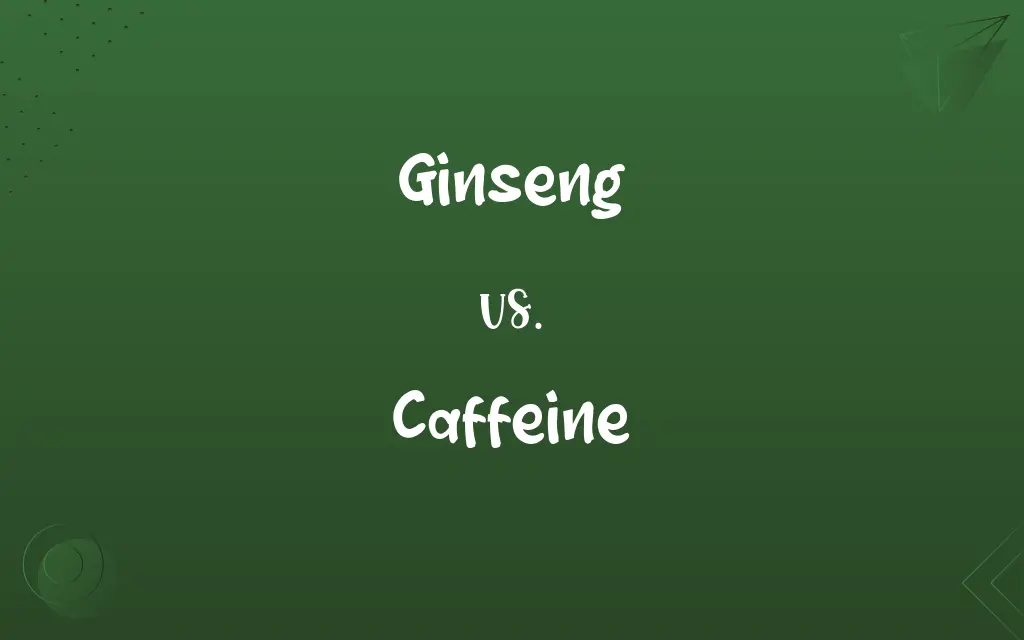Ginseng vs. Caffeine: Know the Difference

By Shumaila Saeed || Published on January 13, 2024
Ginseng is a natural herb used in traditional medicine for enhancing well-being, while caffeine is a stimulant found in coffee and tea, known for boosting energy and alertness.

Key Differences
Ginseng, a plant root revered in traditional medicine, is believed to have restorative properties, aiding in stress relief and overall wellness. Caffeine, on the other hand, is a natural stimulant predominantly found in coffee, tea, and some sodas, widely consumed for its ability to enhance alertness and reduce fatigue. Both substances are sought after for their energy-boosting qualities, yet they operate through different mechanisms in the body.
Shumaila Saeed
Jan 13, 2024
The use of Ginseng spans centuries, particularly in East Asian cultures, where it's valued for its potential to strengthen the immune system and enhance stamina. Caffeine's use is more globally widespread, primarily valued for its immediate effects on mental alertness and concentration. While Ginseng is often consumed in herbal teas or supplements, caffeine is most commonly ingested through beverages like coffee and energy drinks.
Shumaila Saeed
Jan 13, 2024
Ginseng's effects in the body are attributed to its complex mix of ginsenosides, which are believed to have anti-inflammatory and antioxidant properties. Caffeine, conversely, works by blocking adenosine receptors in the brain, leading to increased neuronal firing and the release of neurotransmitters like dopamine and norepinephrine. This difference in action highlights Ginseng's role in holistic well-being versus caffeine's targeted impact on alertness.
Shumaila Saeed
Jan 13, 2024
The side effects associated with Ginseng are relatively mild and may include digestive issues and headaches. Caffeine, while safe in moderation, can lead to side effects like insomnia, nervousness, and in higher doses, increased heart rate and blood pressure. This contrast underscores Ginseng's reputation for gentler, more balanced effects compared to the sometimes more intense reactions associated with caffeine consumption.
Shumaila Saeed
Jan 13, 2024
Finally, the duration of effects differs significantly between Ginseng and caffeine. Ginseng's benefits are often realized over prolonged use, with cumulative effects on body systems. In contrast, caffeine provides a quick, temporary boost in energy and alertness, often followed by a 'crash' as the effects wear off. This temporal distinction is key in understanding their respective roles in health and daily function.
Shumaila Saeed
Jan 13, 2024
ADVERTISEMENT
Comparison Chart
Cultural Association
Traditional Eastern medicine
Global consumption in beverages
Shumaila Saeed
Jan 13, 2024
Mechanism of Action
Ginsenosides affecting body systems
Blocks adenosine receptors in the brain
Shumaila Saeed
Jan 13, 2024
ADVERTISEMENT
Ginseng and Caffeine Definitions
Ginseng
A natural adaptogen known for balancing body functions.
Athletes sometimes use Ginseng for its stamina-enhancing qualities.
Shumaila Saeed
Dec 20, 2023
Caffeine
A stimulant compound found in coffee and tea.
I need my morning coffee for that caffeine kick to start the day.
Shumaila Saeed
Dec 20, 2023
Ginseng
A plant of the genus Panax, used in traditional medicine.
My tea blend includes Ginseng for its immune-boosting properties.
Shumaila Saeed
Dec 20, 2023
Caffeine
A common ingredient in energy drinks and some medications.
The headache medicine contains caffeine to enhance pain relief.
Shumaila Saeed
Dec 20, 2023
Ginseng
A medicinal root used in herbal therapies.
The herbalist recommended Ginseng to help with my stress levels.
Shumaila Saeed
Dec 20, 2023
ADVERTISEMENT
Caffeine
A psychoactive substance that boosts alertness.
The caffeine in my afternoon espresso helps me focus during long meetings.
Shumaila Saeed
Dec 20, 2023
Ginseng
A dietary supplement for enhancing physical and mental well-being.
Ginseng capsules are part of my daily health regimen.
Shumaila Saeed
Dec 20, 2023
Caffeine
A naturally occurring compound that stimulates the central nervous system.
Caffeine can sometimes make me feel jittery if I have too much.
Shumaila Saeed
Dec 20, 2023
Ginseng
An ingredient in Eastern medicine, revered for its healing properties.
The recipe for wellness soup calls for a slice of Ginseng root.
Shumaila Saeed
Dec 20, 2023
Caffeine
A bitter substance used to improve mental performance.
A bit of caffeine before my exam helps with concentration.
Shumaila Saeed
Dec 20, 2023
Ginseng
Any of several plants of the genus Panax, especially P. ginseng of East Asia or P. quinquefolius of North America, having small greenish flowers grouped in umbels, palmately compound leaves, and forked roots used in herbal medicine.
Shumaila Saeed
Dec 13, 2023
Caffeine
A bitter white alkaloid, C8H10N4O2, found in certain plants such as cacao, coffee, kola, and tea, that stimulates the central nervous system and body metabolism and is used in medicine, usually in combination with other drugs, to relieve headaches and treat respiratory conditions in premature infants.
Shumaila Saeed
Dec 13, 2023
Caffeine
An alkaloid, C8H10N4O2, found naturally in tea and coffee plants which acts as a mild stimulant on the central nervous system.
Shumaila Saeed
Dec 13, 2023
Ginseng
Any plant of two species of the genus Panax (Panax ginseng and Panax quinquefolius), having forked roots supposed to have medicinal properties.
Shumaila Saeed
Dec 13, 2023
Caffeine
A bitter alkaloid found in coffee and tea that is responsible for their stimulating effects
Shumaila Saeed
Dec 13, 2023
Ginseng
A plant of the genus Aralia, the root of which is highly valued as a medicine among the Chinese. The Chinese plant (Aralia Schinseng) has become so rare that the American (A. quinquefolia) has largely taken its place, and its root is now an article of export from America to China. The root, when dry, is of a yellowish white color, with a sweetness in the taste somewhat resembling that of licorice, combined with a slight aromatic bitterness.
Shumaila Saeed
Dec 13, 2023
Ginseng
Chinese herb with palmately compound leaves and small greenish flowers and forked aromatic roots believed to have medicinal powers
Shumaila Saeed
Dec 13, 2023
Repeatedly Asked Queries
What is Ginseng?
Ginseng is a medicinal plant root used for its health benefits.
Shumaila Saeed
Jan 13, 2024
What does Caffeine do to the body?
Caffeine stimulates the brain by blocking adenosine receptors.
Shumaila Saeed
Jan 13, 2024
Can Ginseng boost energy?
Yes, Ginseng can enhance energy levels, particularly over time.
Shumaila Saeed
Jan 13, 2024
How does Ginseng work in the body?
Ginseng works by influencing various body systems through its ginsenosides.
Shumaila Saeed
Jan 13, 2024
What is Caffeine?
Caffeine is a natural stimulant found in coffee, tea, and some sodas.
Shumaila Saeed
Jan 13, 2024
Can Ginseng help with stress?
Yes, Ginseng is believed to help reduce stress and improve mood.
Shumaila Saeed
Jan 13, 2024
How is Ginseng commonly consumed?
Ginseng is often taken as tea, supplements, or extracts.
Shumaila Saeed
Jan 13, 2024
What are common sources of Caffeine?
Coffee, tea, energy drinks, and some sodas are common caffeine sources.
Shumaila Saeed
Jan 13, 2024
Are there any side effects of Ginseng?
Ginseng can have mild side effects like digestive issues.
Shumaila Saeed
Jan 13, 2024
What are the side effects of Caffeine?
Caffeine can cause insomnia, nervousness, and in high doses, heart issues.
Shumaila Saeed
Jan 13, 2024
Does Caffeine affect sleep?
Yes, caffeine can disrupt sleep patterns if consumed late in the day.
Shumaila Saeed
Jan 13, 2024
How quickly does Caffeine work?
Caffeine effects can be felt within 15-30 minutes of consumption.
Shumaila Saeed
Jan 13, 2024
Is Caffeine good for alertness?
Yes, caffeine is effective in increasing alertness and concentration.
Shumaila Saeed
Jan 13, 2024
Is Ginseng safe for everyone?
Ginseng is generally safe but should be avoided in certain conditions like pregnancy.
Shumaila Saeed
Jan 13, 2024
Can Ginseng improve immune function?
Some studies suggest Ginseng may strengthen the immune system.
Shumaila Saeed
Jan 13, 2024
Can Ginseng be taken daily?
Yes, Ginseng can be taken daily as part of a health regimen.
Shumaila Saeed
Jan 13, 2024
Can children consume Caffeine?
Caffeine is not recommended for children due to its stimulating effects.
Shumaila Saeed
Jan 13, 2024
What are the benefits of Caffeine?
Caffeine's benefits include improved mental alertness, concentration, and in some cases, physical performance.
Shumaila Saeed
Jan 13, 2024
Is Caffeine addictive?
Caffeine can be habit-forming and lead to dependence with regular use.
Shumaila Saeed
Jan 13, 2024
How long do Ginseng's effects last?
Ginseng's benefits are cumulative and may be felt over prolonged use.
Shumaila Saeed
Jan 13, 2024
Share this page
Link for your blog / website
HTML
Link to share via messenger
About Author
Written by
Shumaila SaeedShumaila Saeed, an expert content creator with 6 years of experience, specializes in distilling complex topics into easily digestible comparisons, shining a light on the nuances that both inform and educate readers with clarity and accuracy.








































































